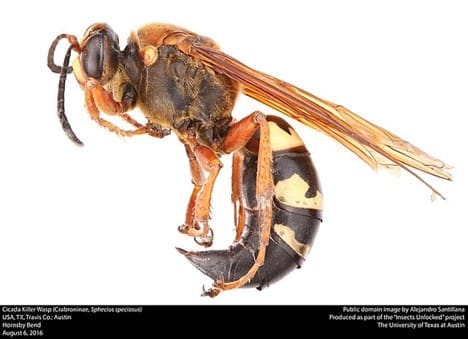Cicada Killer Wasps, scientifically known as Sphecius speciosus, are “solitary wasps,” meaning they hunt and capture other insects to feed their young. Although they are not usually aggressive towards humans, they are lethal to cicadas. Kansas State University horticulture expert Cynthia Domenghini said it’s common for cicada killer wasps to nest in lawns and gardens around homes.
“At about one and a half inches long, cicada killers are an intimidating wasp. They have reddish-colored wings and legs and a black abdomen with wide, yellow stripes,” Domenghini said. Female cicada killers, equipped with a stinger, use it to paralyze their prey. However, they rarely sting humans unless provoked. Males are smaller and lack a stinger.
Domenghini explained, “The female is responsible for locating cicadas and paralyzing them with her stinger. She then carries the cicada back to her burrow. Each burrow can house up to 20 cicadas.”
Cicada killers have one generation per year, with adults most active during June and July before dying off in early fall. Domenghini noted that cicada killers typically cause minimal damage to landscapes. However, a heavy infestation can be a nuisance due to nest protection and burrows, especially in lawns. They prefer well-drained, light soils in full sun and tend to avoid mulched areas. “Maintaining a thick, healthy lawn is the best prevention against burrows,” she advised.
Pesticides are not recommended, as adults are present for only about two months, starting in mid-to late summer.













